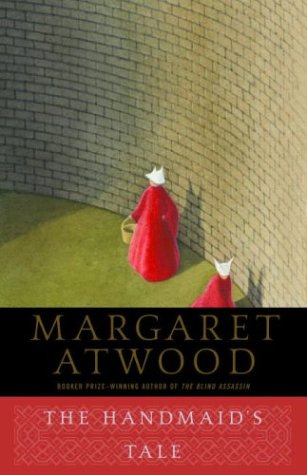The Handmaid's Tale
By Margaret Atwood
Published 1985
Published by Anchor Books
Source: Borrowed
Published by Anchor Books
Source: Borrowed
Offred is a Handmaid in the Republic of Gilead. She may leave the home of the Commander and his wife once a day to walk to food markets whose signs are now pictures instead of words because women are no longer allowed to read. She must lie on her back once a month and pray that the Commander makes her pregnant, because in an age of declining births, Offred and the other Handmaids are valued only if their ovaries are viable. Offred can remember the years before, when she lived and made love with her husband, Luke; when she played with and protected her daughter; when she had a job, money of her own, and access to knowledge. But all of that is gone now...
So I was hangin' out, reading a dystopia, like I do and my friend was all "Oh hey, if you like dystopias, you should read this book. I'll bring it for you." And then, the next day she showed up with it. Which of course means that I had to read it and then have thoughts about it. Nevermind that this book is approximately as old as I am and I hadn't yet read it. Whoops? Yeah, whoops seems about right.
The Handmaid's Tale is the kind of dystopia that is definitely of its time to the point where things seem frankly, dated. It was almost refreshing in that datedness actually. In this universe there are still cars and not hovercraft and regular weapons instead of laser guns and such things. It's one of those books that is almost plausible whereas other dystopias tend to be a bit of a stretch in a lot of ways. The premise of The Hunger Games for example, is accepted within its own universe where society did get to a point that an annual child murder fest was a thing that happened, but it can be difficult to apply that kind of extreme classism to our own lives. Handmaid's Tale doesn't have to work all that hard to subjugate women in a "get back in the kitchen" way that could very easily happen in a world where feminism fails and the patriarchy wins. And really, if this weren't written by Margaret Atwood, I'd be wondering if this was actually a feminist book or not. It tells its story so completely and builds its world so strongly that it's easy to lose yourself in the horror that is this woman's reality. It's an engaging book that, once you get into it is tremendously hard to put down. It did, however, take me a bit to get into it.
One big criticism, though: Stop it with the epilogues. Please. Pleaaaaaaaaaase stop with the epilogues. They don't add a lot and no matter how creatively they're done, they only serve to jerk someone out of the world and away from an otherwise satisfying ending. Not everything needs a happily ever after or anything even remotely close to it. I have yet to find an epilogue that serves the story and doesn't actually take away from everything that came before it.

